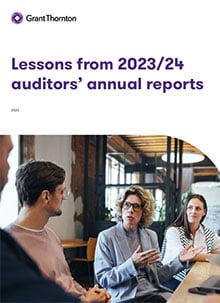
What can Auditors' Annual Reports teach us?
In June 2025, we reviewed 100 Auditors' annual reports (AARs) produced by Grant Thornton for our local government audited bodies across England. This represents about a third of all councils in the country. These reports, covering the audit year 2023/24, offer a wealth of insights on what works, and what doesn’t, when it comes to value for money and governance.
Among the councils we reviewed were eight relatively new unitary authorities formed during or since the local government reorganisation of 2019. Their experiences reveal a lot about how to navigate change in a complex and challenging environment.
Three recommendations to keep in mind
When weaknesses in arrangements or improvements are identified in our value for money work, they all into one of three categories:
-
Statutory recommendations
These relate to significant weaknesses reported under Section 24 (Schedule 7) of the Local Audit and Accountability Act 2014. They require a published written response.
-
Key recommendations
While still addressing significant weaknesses and identified under the NAO Code of audit practice, these are actions the council should take but do not require a published written response.
-
Improvement recommendations
These focus on improvements in arrangements which, if implemented, should improve the arrangements in place at the council, but are not a result of identifying significant weaknesses.
Key findings
Our review uncovered several common themes that may resonate with you or your organisation. Here are the key areas where councils can learn and improve:
Financial sustainability: focus on the long game
The reports in our sample showed that financial sustainability remains the major challenge for the majority of councils. Poor governance has led to some councils depleting their reserves and others incurring excessive borrowing. Government policy has been to introduce exceptional financial support, including permitting borrowing to fund revenue shortfalls. The effect is that in-year revenue costs are being pushed onto a future generation of taxpayers, especially when coupled with special educational needs and disability statutory override.
Governance matters: strengthen the foundations
Other common challenges for councils include gaps in risk management; high vacancy rates in internal audit; de-centralised contract management; under-supported project management; and the need for stronger, timelier data on performance.
Housing challenges: don’t let repairs pile up
For Councils with Housing Revenue Accounts, there are also significant challenges with identifying, costing and managing high volumes of backlog repairs and maintenance work needed to meet regulatory standards.
Getting ready for Local Government Reorganisation
Local government reorganisation offers a fresh start, but it also comes with its share of complexities. For councils going through reorganisation—or considering it—our findings provide valuable lessons:
These include:
- Managing the workforce transition
- Maintaining staff wellbeing
- Introducing effective internal control;
- Validating data input to new systems
- Harmonising contact management arrangements
The rate of statutory recommendations for the eight relatively new unitary councils is higher than in the AARs for other councils, which underlines how complex reorganization can be. Nevertheless, reorganization remains a huge opportunity, and one that may reap many benefits if well prepared for.

What’s next? Access more insights
Our full report dives deeper into these findings. It includes anonymised case studies, practical advice, and good practice questions that council members and officers can ask themselves.
If you’d like to discuss these findings or explore how they apply to your organisation, feel free to reach out to our team of experts.








